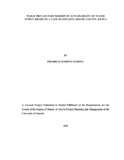| dc.description.abstract | Public- Private Partnership in water projects is geared towards sustainability in the water supply programs. In Kisumu, Kisumu Water and Sewerage Company (KIWASCO) has been the main Public private partnership on sustainability of water supply projects in the region. KIWASCO was established through the reforms that took place in the water sector nationally and based on the decision to privatize essential services. The purpose of the study was to establish the influence of public private partnership on sustainability of water supply projects: a case study of (Kisumu Water and Sewerage Company) KIWASCO in Kisumu, Kenya. The study was guided by the following research objectives: funding, technology and innovation, risks involved and economic diversification and how they influence sustainability of water supply project in KIWASCO. The research design used was descriptive survey. The study targeted a sample of 382 KIWASCO water users and 10 KIWASCO officials in all managerial positions. The data collection instruments included a questionnaire and an interview guide. Data analysis was descriptive in the form of frequencies and percentage. From the study findings, data collection was regular with data analysis carried mainly through software. Descriptive tables were used to display distribution of population in relation to demographic factors. Descriptive statistics (that is frequency analysis) was computed for presenting and analyzing the data. This ensured efficiency and effective data presentation. The study found out that project financial auditing affected sustainability of water supply to a great extent. Project financial utilization affected sustainability of water supply to a great extent. Adequacy of project equipment affected sustainability of water supply to a great extent. Reliable water connectivity affected sustainability of water supply to a great extent. Elaborate risk management plan affected sustainability of water supply to a great extent. Increased farming activities and self-sustenance affected sustainability of water supply to a great extent. Creation of employment affected sustainability of water supply to a great extent. The study concluded that project financial auditing, financial utilization and budget reliability affected sustainability of water supply to a great extent. The study revealed that adequate equipment, reliable water connectivity and quality of water affected sustainability of water supply to a great extent. Elaborate risk management plan prevents hazards from happening in advance. Risk preparedness helps KIWASCO in getting ready for inevitable hazards for instance natural drought and famine. Risk communication and sharing helps KIWASCO in dividing its risks and losses with both private and public partners. Reduced water prices has led to increased savings and investments. The study recommends that KIWASCO should be scrutinized and audited by external auditors annually. The pumps should be durable to avoid breakage. Water treatment plants need to be implemented and be well maintained to avoid hazardous water supply.There is need to adopt risk mitigation and assessment to prevent hazards from happening in advance. | en_US |

